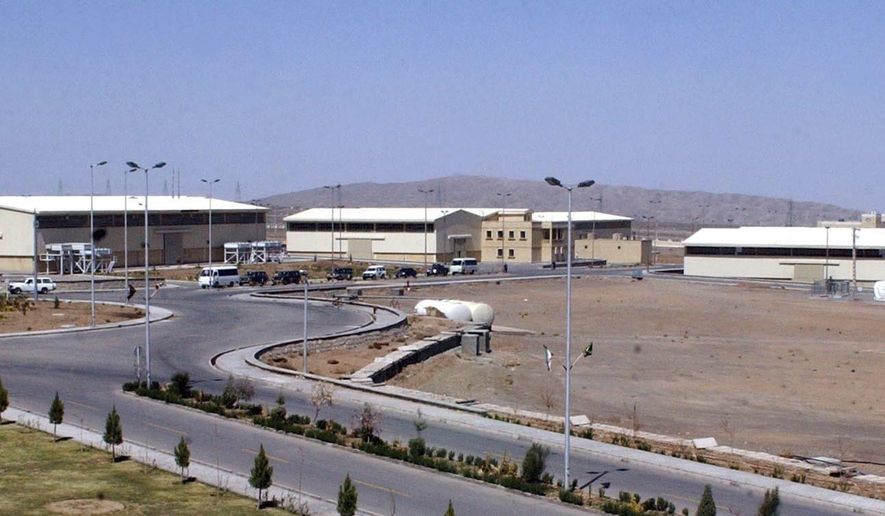Iran began barring U.N. inspectors from nuclear sites over the weekend, days after the Biden administration freed up $6 billion in frozen funds in pursuit of a prisoner swap.
The development, which comes as Iranian President Ebrahim Raisi prepares for a visit to New York City to address the U.N. General Assembly, adds a fresh layer to rising tensions over Tehran’s nuclear activities.
In a rare statement, U.N. nuclear watchdog chief Rafael Grossi said Saturday that Iranian officials had informed him they will no longer permit certain International Atomic Energy Agency inspectors to conduct “essential verification work at the enrichment facilities in Iran which are under Agency safeguards.”
“Iran has effectively removed about one-third of the core group of the agency’s most experienced inspectors designated for Iran,” Mr. Grossi said.
The inspectors are in Iran to ensure compliance with the Treaty on the Non-Proliferation of Nuclear Weapons. Mr. Grossi acknowledged that under the NPT, Iran is permitted to veto individual inspectors it does not agree with. But the IAEA chief said Tehran’s latest move is unwarranted.
“I strongly condemn this disproportionate and unprecedented unilateral measure which affects the normal planning and conduct of agency verification activities in Iran and openly contradicts the cooperation that should exist between the agency and Iran,” he said.
A Vienna-based diplomat told Reuters that Tehran had “de-designated” all French and German members of the IAEA inspection team in Iran.
The news agency reported that Iran made the move in response to a call led by the U.S., Britain, France and Germany at the IAEA’s Board of Governors in recent days for Tehran to cooperate immediately with the IAEA on issues including explaining uranium traces found at undeclared nuclear sites.
Iranian officials suggested Tehran is blocking certain IAEA inspectors out of frustration that U.S., British, French and German officials were politicizing the work of the inspectors.
“Unfortunately, despite Iran’s positive, constructive and continuous interaction with the agency, the three European countries and the United States abused the [IAEA’s] Board of Governors for their own political purposes,” Iranian Foreign Ministry spokesperson Nasser Kanaani told state media, according to Reuters.
The presence of IAEA inspectors in Iran has been sensitive since the U.S. pulled out of the 2015 international nuclear accord with Tehran. The agreement had given billions in economic sanctions relief to Iran in exchange for limits to Iranian nuclear activities, as well as IAEA inspections of those activities.
The U.S. has since reimposed sanctions on Iran amid concerns that Tehran is advancing a nuclear weapons program built up clandestinely in violation of U.N. Security Council resolutions. Iran claims its nuclear activities are purely for electricity generation and medical research.
There was no immediate reaction from the Biden administration to the latest developments, which come as Mr. Raisi is slated to address the U.N. General Assembly on Tuesday, hours after President Biden.
Mr. Raisi’s trip comes amid U.S.-Iran tension following the Biden administration’s failure to draw Tehran back to the nuclear negotiating table, as well as attempts by the administration to secure the release of five American citizens imprisoned in Iran.
Mr. Biden recently sought to clear the way for the release with a blanket waiver for international banks to transfer $6 billion in frozen Iranian money from South Korea to Qatar without fear of U.S. sanctions.
The administration also said it would be willing to release five Iranian citizens held in the U.S., although the White House has faced intense heat for what critics say is a “ransom payment” to Tehran.
Whether a prisoner exchange will occur ahead of the General Assembly remains to be seen. Some analysts say that if it does, it will raise the prospect of a meeting between Mr. Biden and Mr. Raisi on the sidelines of the gathering. Such a development could signal progress toward the administration’s goal of engineering a diplomatic thaw with Iran and reviving at least a pale version of the now-defunct 2015 nuclear deal.
The weekend’s developments also coincide with a surge in protests inside Iran marking the anniversary of Mahsa Amini’s death. The 22-year-old Iranian of Kurdish origin died in the custody of the Islamic republic’s morality police, reportedly for flouting an Islamic head-covering law for women. Protests over the past year have seen demonstrators shout anti-government chants and burn their head coverings.
• Guy Taylor can be reached at gtaylor@washingtontimes.com.




Please read our comment policy before commenting.